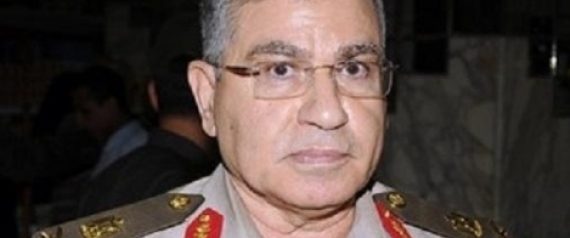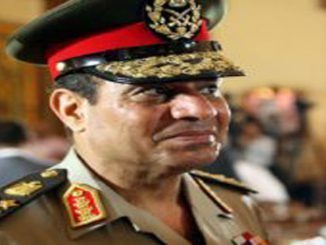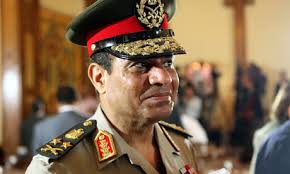
Egypt’s parliament approved the government’s nomination of a retired army general to take office as the new supply minister, a key post tasked with the distribution of subsidized food items on which the majority of Egypt’s 91 million people depend for their survival.
The appointment of Maj. Gen. Mohamed Ali el-Sheikh, who retired from active service about 18 months ago, reflects the Egyptian Armed Forces role in extending it power in running the country under Abdel-Fattah al-Sisi, the former Defense Minister who launched a military coup against Egypt’s first democratically elected President Mohamed Morsi in 2013.
El-Sheikh replaces Khaled Hanafi who resigned last month amid corruption allegations involving wheat procurement. Hanafi has not been charged with any crime yet.
Egypt is the world’s largest wheat importer and the Supply Ministry is in charge of both importing it and running the country’s massive state food subsidy program.
Before he retired, el-Sheikh was in charge of the military’s supply network, which oversees the distribution of food, water and fuel to all units. After retirement, he took over the military’s department running hundreds of outlets selling food items at discount prices to the civilian population, a network that has recently been expanded to counter double-digit inflation, according to Huffington Post.
More than any of his predecessors, al-Sisi has expanded the military power by delegating the armed forces to rebuild Egypt’s ailing economy, and has launched mega projects to upgrade infrastructure, reclaim areas of the desert, build roads and housing projects, with civilian companies mostly working under army supervision.
The military’s growing involvement in economic projects — from importing livestock to running gas stations, to hotels and, most recently, private schools — has come under fire by critics in recent days, with some demanding that what they describe as the military’s economic empire be placed under government oversight.
Last month, al-Sisi said in an interview, “We must not forget the role of the armed forces in reducing prices through the relevant departments that import livestock, frozen meat and poultry without middle men and at lower prices.”
Even food servicing was among Egypt’s Armed Forces recent economic activities. Dr. Mohamed Osman Al-Khosht, the Cairo University Vice President for Education and Student’s Affairs, unveiled recently that Cairo University signed a contract with Egypt’s Armed Forces to supervise the food services and the hostels’ kitchens.
Moreover, last weekend the military also signaled its latest incursion into commerce, saying it would together with the Health Ministry work to break the “greedy monopoly” of infant milk importers and directly import the item. In addition, MP Makram Radian, who is a member of the Health Committee has added that the Armed Forces are also planning to start their own factory to provide milk and medicine for children.
The announcement followed a series of small but significant demonstrations by young mothers, crying babies in their arms, who protested over the severe shortage of the heavily subsidized infant milk.
Another significant factor regrading the infant milk crisis, was that hours after the escalating crisis, the Egyptian Minister of Health Ahmed Emad said that the Egyptian Armed Forces pumped 30 million packages of infant milk in the pharmacies for 30 pounds each instead of 60 pounds. The question raised by activists then was: “From where did the Armed Forces get the Infant Milk?”
In this context, Dr. Mohamed Mahsoub, the former minister of state for parliamentary affairs during President Mohamed Morsi’s era, commented on the Egyptian Armed Forces interference in the infant milk crisis by providing 30 million infant milk packages as well as supervising the food services and the hostel kitchens of Cairo University recently, saying on his Tweeter account,”From where did the infant milk reach the Egyptian Armed Forces to pump it to the Ministry of Health?”
In March 2014, the Washington Post said that the Egyptian Armed Forces control nearly 60% of the Egyptian economy pointing that the revenues of these projects aren’t announced to the Egyptian public.
On the other hand, Egypt is witnessing one of its harshest economic crisis in its history. Tourism and foreign investment -the two major sources of hard currency- have declined causing a severe foreign currency shortage. In addition, Egypt’s currency is losing its value, inflation and unemployment rates are hiking. Last month, Egypt initially secured a $12 billion loan over three years from the International Monetary Fund in exchange for what is thought to be an economic reform is a risky program that could see, among other things, subsidies gradually removed and the local currency devalued or floated.



